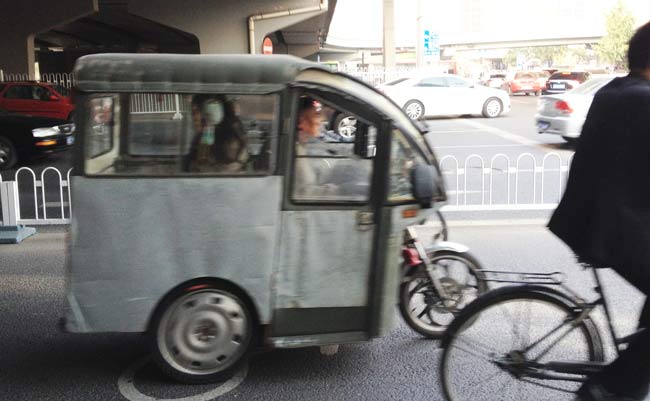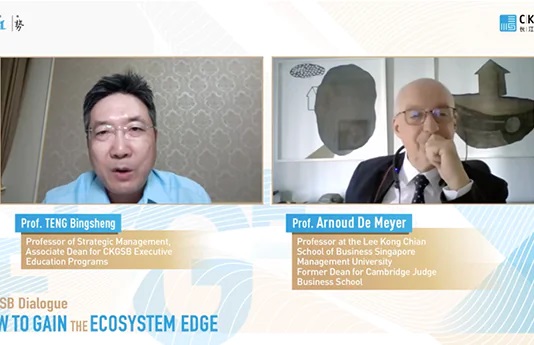
What industry incumbents can learn from the forces that guide market entry.
Walking to work a couple weeks ago I passed Beijing’s Jianguomen subway station as I always do. I was surprised to find that the usual line of three-wheeled vehicles crowding the sidewalk outside the subway station was gone. These vehicles are usually waiting to pick up passengers (for a fee of course) and ferry them to their destinations. The pathway was no clearer than before however; it had been replaced by a line of motorbikes looking for passengers. I wondered why and after arriving at my office, I did some research. I discovered that the day before the Beijing government had cracked down on illegal operators of three-wheeled vehicles. As a result, many of the operators had been pulled off the street and had been summarily replaced by the two-wheelers.

Besides changing some people’s daily commute, the switch I witnessed was an illustration of one of the most powerful economic forces–entry. The threat of entry is a key disciplining device for industry incumbents. If entry into an industry is allowed and easy, then incumbents’ prices and profits will be limited. If incumbents attempt to raise their prices too much, those waiting in the wings will enter and undercut them. This keeps incumbents honest and benefits consumers by keeping prices low.
Over the long run potential entrants play an analogous role in pushing innovation. If incumbents become lazy and out of touch with what customers want, then they will be supplanted by start-ups offering more compelling products. This keeps incumbents on their toes and provides better products for consumers.
Because entry is such a powerful force every manager should assess their company’s strategy in light of it. The scene I witnessed on the street suggests three questions that every manager should ask themselves. First: who is the most likely entrant I face? My walk past the subway station illustrates that two-wheelers are the most likely to replace three-wheelers if the latter raise their prices too high or don’t provide good service. When properly licensed three-wheelers return to work, they should keep this in mind. The most likely entrant you face may not be so easy to spot. A number of industries have been disrupted by entry from not-so-obvious places. For example, most television stations never expected to compete for people’s time with user-generated content streamed over the internet.
It can be hard to predict who might enter but there are likely candidates to think about. Beware of suppliers forward integrating. Foxconn, the giant Taiwanese contract manufacturer of phones and tablets, is now trying to build its own brands in handsets. Beware also of buyers backward integrating. JD.com, which began as an e-commerce company hiring outsiders to deliver its sales, has built its own distribution network allowing them to provide next-day delivery to 206 Chinese cities. Partners who provide complementary services also deserve scrutiny. Google originally provided mobile services such as search and maps that operated on others’ operating systems but then decided to build its own Android operating system. Alibaba Group’s Alipay service always worked with traditional banks so that its users could fund and clear their accounts. But Alibaba recently gained approval to begin offering its own deposit and loan services.
Second: how much of a threat will a new entrant be? The answer to this question tells you how well you need to be doing. For three-wheelers, motorbikes are not much of a threat. Since I had never seen them outside the subway station before in all my previous walks, potential passengers don’t really see them as a good substitute for three-wheelers. However, in other industries entrants can be much more threatening. SMS message revenues for China’s three mobile carriers have dropped precipitously with the rapid rise of Tencent’s WeChat service. WeChat is a big threat because it allows the user to record rather than type their message saving the user time while allowing the message to convey emotions. Although the carriers still earn data revenue from WeChat usage it is far less than what SMS messages would generate. If a potential entrant poses a big threat it pays to start thinking about that now.
Third – how fast can it happen? The answer to this question will tell you how long you have to prepare. The entry of two-wheelers was extremely swift. They filled the void left by the non-licensed three-wheelers in one day. Entry is often not so fast. Setting up a search engine business to compete with Baidu will take a bit longer than showing up outside the Jianguomen subway station on a two-wheeler. As a manager you should think about ways to extend the entry time as long as possible. For example, Alibaba collects credit information on users of its online trading platform. The longer it collects this information, the more accurate it gets. Anyone hoping to compete with Alibaba would need roughly the same amount of time gathering that information to provide a similarly accurate credit score.
If you anticipate entry properly and take actions in time to forestall any threat, then you will never see your entrants. But you should still try to imagine them.
Update: I previously discussed a game being played by China’s big appliance retailers in which they promised to always undercut each other’s prices. As I discussed, the firms did not credibly commit to this policy because of its destructive consequences. More recently, two of China’s biggest taxi apps companies (a service I have also discussed) made a similar promise to always subsidize usage of their apps by more than the other. After spending billions of RMB, these companies also seem to have backed off of their promises.


















